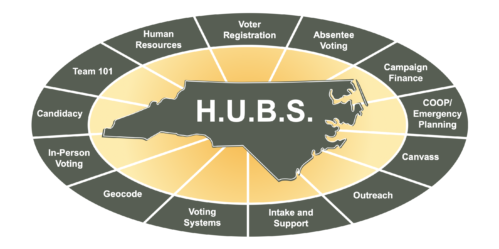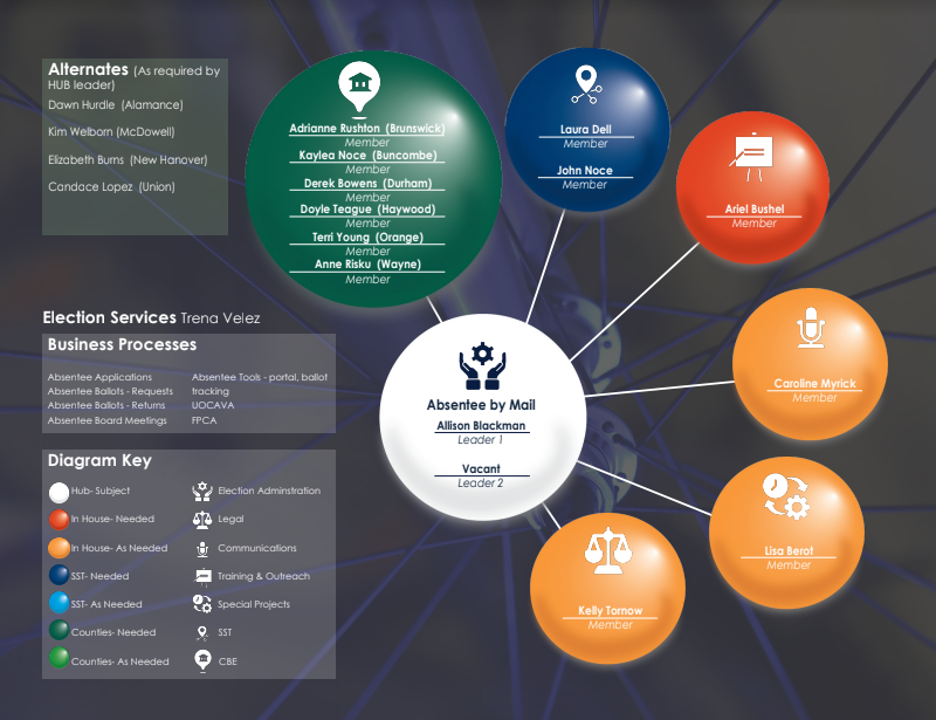December 15, 2022
North Carolina’s “Help Us Be Successful” (HUBS) Program
The case study and workbook are available for download:
How North Carolina and its 100 county Boards of Elections launched a collaborative support program
State and local election officials have distinct roles. State officials provide oversight and directives, manage statewide infrastructure, and support local offices. Local officials provide voter registration and voting services directly to the public. This dynamic can create tension – but it is also an opportunity to break down silos and create a community of shared perspectives and best practices.

Opportunity for Collaboration
Local election officials are challenged to be experts not only at running elections, but also on election law, logistics, cybersecurity, physical safety, recruitment and training, and public communications. Local officials approach each of these from different perspectives and use different techniques, often based on budget and jurisdiction size, which result in practices that can vary significantly.
State election officials play a central role in supporting local officials and making sure laws and policies are implemented uniformly. However, collaboration on a statewide level can be difficult, though it is essential.
“Collaboration is important because the State has a different perception and responsibilities on their end,” Alexander County elections director Patrick Wike said. “We are both on the same mission but wear different hats and it is sometimes difficult seeing each other’s perspective.”

What if instead of a top-down, disconnected customer service model, state and county officials collaborated in a dynamic, creative environment? Further, what if a program was structured to develop and share best practices and tools statewide?
During her first few months as Executive Director of the North Carolina State Board of Elections (NCSBE), Karen Brinson Bell prioritized county support as part of the agency’s mission. Security and Support Technicians were hired mid-2020 with an emphasis on on-site support and building uniform processes across the state. Simultaneously, to have more uniform processes, a collaboration between the state and counties needed to exist to develop materials based upon best practices that could be applied by any county office. From this realization was born the idea for Help Us Be Successful (HUBS) and a new approach to work between the state and county offices.
Prior to her appointment as North Carolina’s chief election official, Bell served as the elections director in Transylvania County. Her leadership team at NCSBE includes others with backgrounds running county elections, like deputy director Trena Velez. As the former elections director in western North Carolina’s Buncombe County, Velez said she knew county directors wanted to be involved in decision making. She also knew counties often structured their organization into teams centered around key election areas.
“Our purpose was to create a collaborative place where successful elections could be achieved through multi-directional energy and action,” Bell wrote in her 2021 U.S. Election Assistance Commission Clearinghouse Award submission, noting that she believed strongly that collaboration and ownership across all parties would make the entire state election system better. “We wanted strong connections and constant communication, and we needed to create a system for that.”
The Solution
In early 2021, the NCSBE HUBS Committee launched. They came up with a basic program structure. There would be several teams – or HUBS, as they’re called by North Carolina officials – each focused on a different area of elections administration. The HUBS were seen as collaborative think tanks. Each team had two NCSBE staff leads, with additional members from state and county staff. Members were assigned to teams based on their subject matter expertise.
During the pilot year, 13 HUBS teams were formed for the following areas:

NCSBE produced a starter guide and presented its concept to the counties. Each county was invited to volunteer staff to the various HUBS. Counties were receptive to the idea. They participated in a survey through which they nominated employees as delegates and alternates to the various teams. The HUBS groups were then randomly ordered. Using employees listed in the nomination survey, the first HUBS team selected their first delegate, then the second team made their selection, and so on. This “draft” continued until each position on each HUBS team was filled.
County employees are only allowed to serve on one HUBS team at a time, ensuring broad participation and diversity. The state encouraged leads to build their team from both big and small counties, and from new and experienced employees.

Within their area of specialization, the new working groups identified opportunities to create or improve standard operating procedures, forms, training materials and other items that would benefit election officials statewide.
HUBS teams met virtually each month and, through their efforts, had a number of successes during the pilot year. This included the development of guidance material for nursing home teams and reconciliation, as well as the creation of a team focused on brainstorming new ideas.
Nursing Home Manual
In North Carolina, counties deploy multi-partisan assistance teams (MATs) to nursing homes. The teams assist with voting and registration services, such as helping residents with disabilities or without nearby relatives apply for and vote absentee ballots.
Not all counties had documented standard operating procedures for these teams. Practices varied from county to county. The Absentee Voting HUBS team put together and shared statewide a comprehensive MAT Manual. The manual helps all counties offer consistent, accessible services to a protected group of voters.
Reconciliation Manual
Reconciliation is the process of balancing the number of voters given credit for voting with the number of ballots cast. Counties manage detailed logs to ensure all ballots are accounted for and any discrepancies are resolved. New directors or inexperienced staff might not have an awareness of proper controls and methods needed to balance an election.
Wike, who began working for the Alexander County Board of Elections in 2013, served on the Canvass HUBS team, which focuses on reconciliation. He recognized that while counties have figured out their own reconciliation processes, there were unique challenges and constraints faced by counties for various reasons. The team worked extensively to share best practices and identify the reports and mechanisms most suited to a successful reconciliation. Their final work product was a standard reconciliation template that could be used by even a new director.
Team 101
There are 100 counties in North Carolina and one State Board of Elections. During a state elections conference, Bell pitched that no longer would there be a separation of the two entities, rather a Team of 101. North Carolina’s election officials have rallied around this and the HUBS collaboration has solidified the unified effort. As a HUBS group, Team 101 is tasked with coming up with new ideas for the other HUBS teams to collaborate on or special projects that are not specific election administration subjects but may help the state as a whole be more effective in its work. Team members have helped come up with checklists for board members, absentee and mail check-in, and other election processes. The long-term vision is to come up with a statewide election director’s manual. They are also working on the Election Resource Center, which will be a repository to the latest version of documents and tools developed by the HUBS or published by the NCSBE.
The HUBS Charter
Following the pilot year, HUBS leadership at the NCSBE delivered a comprehensive survey statewide to ascertain the “overall health and effectiveness” of the program. Overall, the respondents felt the program was beneficial and added value to their work.
“As I’m doing daily tasks, I’m considering ways to improve the processes, because I feel like I can add value.”
“I enjoy being a part of a HUB. This is a great way to get tasks accomplished and streamlines the various levels of input needed on a project.”
“I appreciate the SBOE creating these HUBS and giving the county BOE’s the opportunity to have input in these processes and documents that affect our ability to be effective election administrators.”
The survey confirmed that basic organizational management challenges were present during the pilot. Namely, not all subject matter experts have management or leadership experience. For the HUBS teams to be more successful, consideration was needed on pairing subject matter experts with strong leaders and communicators. NCSBE is considering a coaching process for HUBS leaders.

The HUBS executive team noted that groups could have been given more leeway initially to be more visionary. Thinking outside the box is an important component of this creative work, and could have been stressed more during the pilot.
The survey results also revealed some typical challenges with a new launch. The common theme was the need for improved structure. Bell’s team took the feedback seriously, and used the results to structure and adopt a Charter in May 2022.
Highlights of the Charter include:
-
Clearly defining the mission, leadership, and membership structure;
-
Providing guidance and direction on meetings and communications;
-
Defining operations; and
-
Establishing reporting requirements.
Establishing organizational structure was one of the key goals in creating the Charter. The HUBS program now operates as follows:
-
HUBS is directed by a NCSBE steering committee.
-
Appointed to each HUBS team are two NCSBE staff who serve as team leads. Teams also have access to representatives from NCSBE legal, communications, and documentation and curriculum management staff, who serve in an advisory role as needed.
-
One or two NCSBE Security and Support Technicians – initially hired in 2020 with federal Help America Vote Act (HAVA) funding – serve on each HUBS team.
Membership is filled by state and county election staff. Members are chosen by a draft of interested persons who then serve two-year terms. Between five and ten county staff are assigned to each HUB.

Challenges
The HUBS program did not encounter any significant challenges to launch. Counties were receptive to the idea. No enacting legislation was required. There was no infrastructure or new business systems needed to start up (HUBS groups met using Microsoft Teams). Other than staff time to attend a monthly meeting and work on projects, there were no direct costs.
Infrastructure Needed
The HUBS program needs minimal fiscal, business system, or policy infrastructure.
Fiscal Impact
County Level
It is common for local elections departments to spend a certain amount of their personnel hours on collaborating, networking, and working directly with the state and other county partners. So far as that is valued as an essential or even ancillary job function, there is no direct fiscal impact at the county level.
HUBS team members meet monthly with fewer meetings around peak election time. In addition, they may spend time doing independent or collaborative work in between meetings. County participants change every two years.
State Level
County support is an essential service provided by all state election divisions. The HUBS program is not seen as an additional expense, but rather North Carolina’s approach to an essential service delivery.
Collaboration Tools
No new business systems were needed to start this effort. HUBS meetings were held using Microsoft Teams. Collaboration on documents was completed using email and Microsoft Sharepoint. Software licenses and security features may need to be addressed for all users to access these platforms.
Legislation
The HUBS program mission is to foster teamwork and collaboration between the state and county officials. No legislation was required to enact this effort; the program charter was sufficient.
Accolades
In 2021, the federal Election Assistance Commission (EAC) awarded the HUBS program its Clearinghouse Award Winner (“Clearie”) in the category of Outstanding Innovations in Elections – Large Jurisdictions.
Clearies are awarded based on innovation, sustainability, outreach efforts, cost-effectiveness, replicability, and generating positive results.



